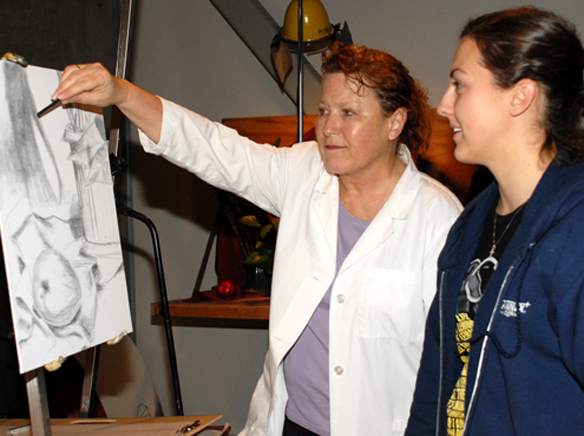Everyone has a favorite-teacher story – the memory often ingrained for life of a particular instructor whose love of the profession has proven inspiring. At Cuyamaca College, the Academic Senate each year recognizes one full-time and one part-time instructor selected by a faculty committee based on student nominations, rankings and reviews.
Everyone has a favorite-teacher story – the memory often ingrained for life of a particular instructor whose love of the profession has proven inspiring. At Cuyamaca College, the Academic Senate each year recognizes one full-time and one part-time instructor selected by a faculty committee based on student nominations, rankings and reviews.
The winners of the Award for Teaching Excellence this year were Debra Babylon, an art instructor for 17 years and a two-time winner for her teaching prowess; and Eddie Sturgeon, a superior court judge by day and an adjunct law professor at Cuyamaca College two nights a week.
“Caring and committed instructors with the knowledge and engaging methods of these two are what makes
Cuyamaca a special place to learn,” said President Mark J. Zacovic. “Their contributions to students are immeasurable.”
Art instructor Debra Babylon knows well how much of a difference an instructor can make in a student’s life.
Without a committed high-school teacher in her hometown of Findlay, Ohio, Babylon said she probably would be struggling to make a living waiting tables.
“It was (this teacher) who helped me get a college scholarship,” Babylon said. “I stayed in contact with her over the years, and I visited her when she was in assisted living.”
Her recent teaching award is the second one for Babylon, a Bowling Green State University alumnus who came to the college district in 1996 as an adjunct instructor at Grossmont College before getting a full-time teaching post in 1998 at Cuyamaca College. In 2003 she received what was then called the Teacher of the Year award.
Her students say her passion for teaching art makes her a standout instructor. Before state budget cuts forced the art department to cut back on independent-study classes, Babylon’s personalized tutoring of her advanced students in developing their portfolios helped a number of them gain entry into top art schools. The San Francisco Art Institute has awarded prestigious scholarships to her most exceptional protégés.
Sitting in Babylon’s basic painting class, it’s immediately evident that making art approachable is a priority. Students find her patient and say she’s able to critique their work without bruising egos.
Kyle Martinez, who recently graduated from the University of San Diego with a degree in interdisciplinary humanities, enrolled in the class to get a basic understanding of art. He believes the fundamentals will come in handy as he pursues his dream to manage a museum.
“I’ve never taken a painting class before, but the instructor makes the concepts easy to grasp, and I’ve been able to learn very quickly,” he said. “I’ve found that this class is not just a painting class, it’s an experience. Sometimes you walk in here and there’s classical music playing in the background. This is a class that is steeped in art of all forms.”
Although saddened by the budget impacts, Babylon remains philosophical. Maybe it will mean she’ll have more time to do her own painting, she notes. “Carpe diem – seize the day,” she said.
That attitude is no doubt attributable to her life as a cancer survivor. Diagnosed at the advanced stages of the disease in 2007, Babylon said her doctor decided to try surgery, even after telling her she only had one to three years to live. She’s now in remission, soon to hit the five-year benchmark since her second operation for metastatic cancer.
“I had taken a medical leave from fall ’07 through spring ’08 and I remember the doctor saying, ‘Well, I guess you are going to have to return to work,’ as I was recovering from the surgery,” she said.
By the start of fall semester in 2008, Babylon was back at Cuyamaca. Carpe diem, indeed.
Cuyamaca College instructor Eddie Sturgeon works his classroom like an attorney working a jury. Not surprising, considering the 15 years he spent practicing criminal law before being appointed to a judgeship in 1988. By day, he is the supervising judge of the East County Division of San Diego Superior Court. Two nights a week he teaches classes in criminal law and civil litigation at Cuyamaca, a post he’s held since the paralegal program started in 1992.
By his estimation, Sturgeon has taught some 2,000 students over the years, two of whom he’s sworn in as attorneys. Student critiques describe him as enthusiastic, compassionate, knowledgeable and dedicated.
He engages students with his Socratic method of teaching, sprinkled with a hint of Perry Mason dramatics. As he teaches, Sturgeon stalks the room, suddenly stopping with a punch to the air to highlight a key point in his lecture. His voice rises as he interjects a courtroom story to lend a real-life relevance to a legal concept.
“He’s awesome,” student Amy Cazares said. “The stories he tells make it easier for me to understand.”
Sturgeon said he is constantly impressed by the commitment shown by his students, especially since most are older students who put in an eight-hour workday before coming to class. He recalls a particular student – a working mother – who rode a bus from Chula Vista to take his class.
He laughs when reminded that he also fits teaching into his busy schedule as a superior court judge.
“I always learn something from my students and it’s a way for me to keep in touch with the younger generation,” Sturgeon said. “It’s a two-way street. I once had a student ask me a very insightful question that probably changed the way I viewed a particular issue relating to family law.”
One only has to peer out the window of Sturgeon’s fourth-floor courthouse office to get a sense of his deep East County roots. He can point out the first schools he attended: Ballantyne Elementary, El Cajon Valley Junior High School and, if you crane your neck a bit, El Cajon Valley High School.
He still resides in East County with his wife of 25 years with whom he has three sons, all college-aged. He hopes one pursues a legal career, much like he encourages his students to continue on to law school.
“No matter what you’re going to do, you can always use a law degree in any field,” he said. “Community college is an excellent place to start. You’re going to see the practical side of the profession and it will help determine if you’re really interested.”














